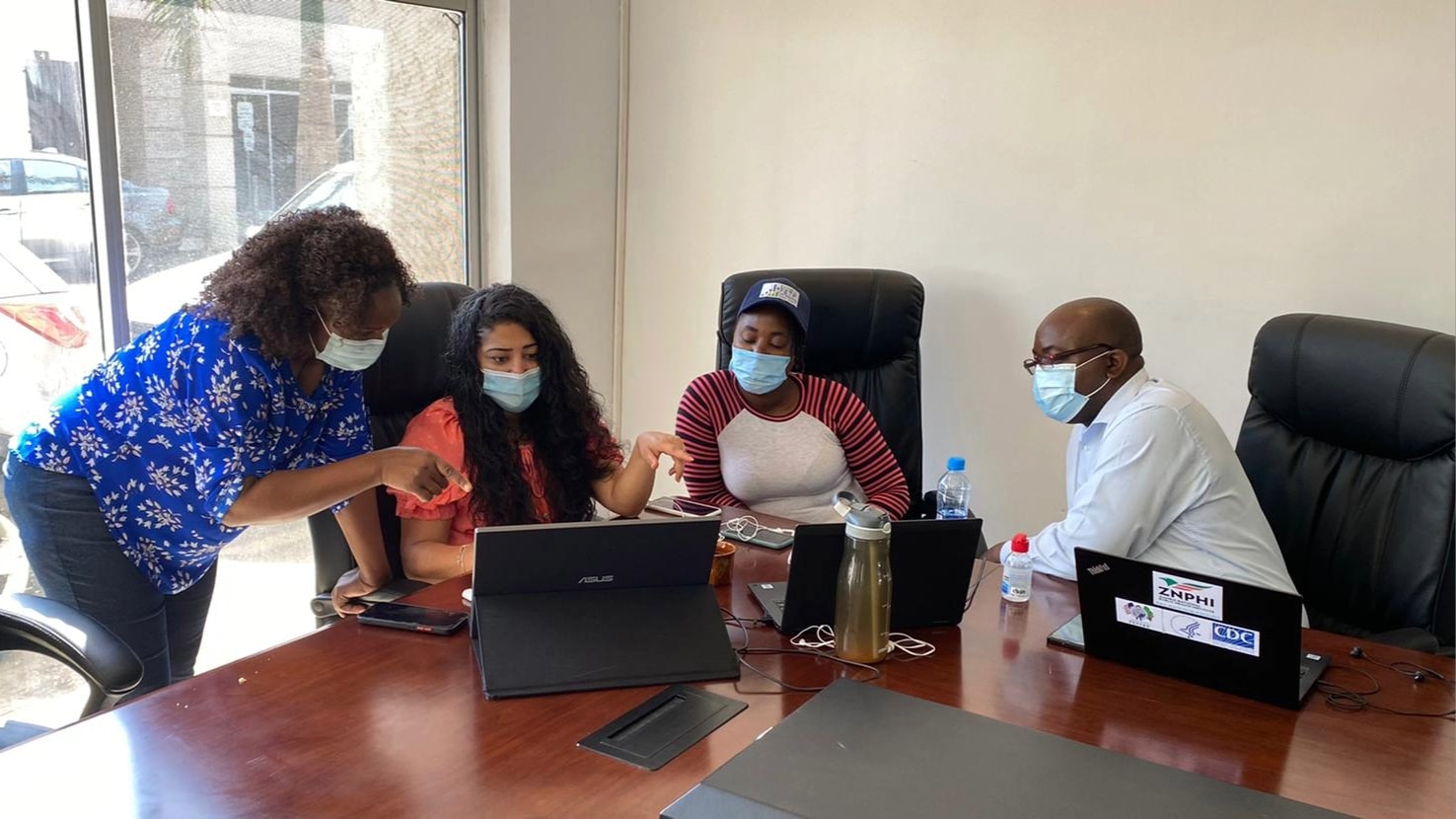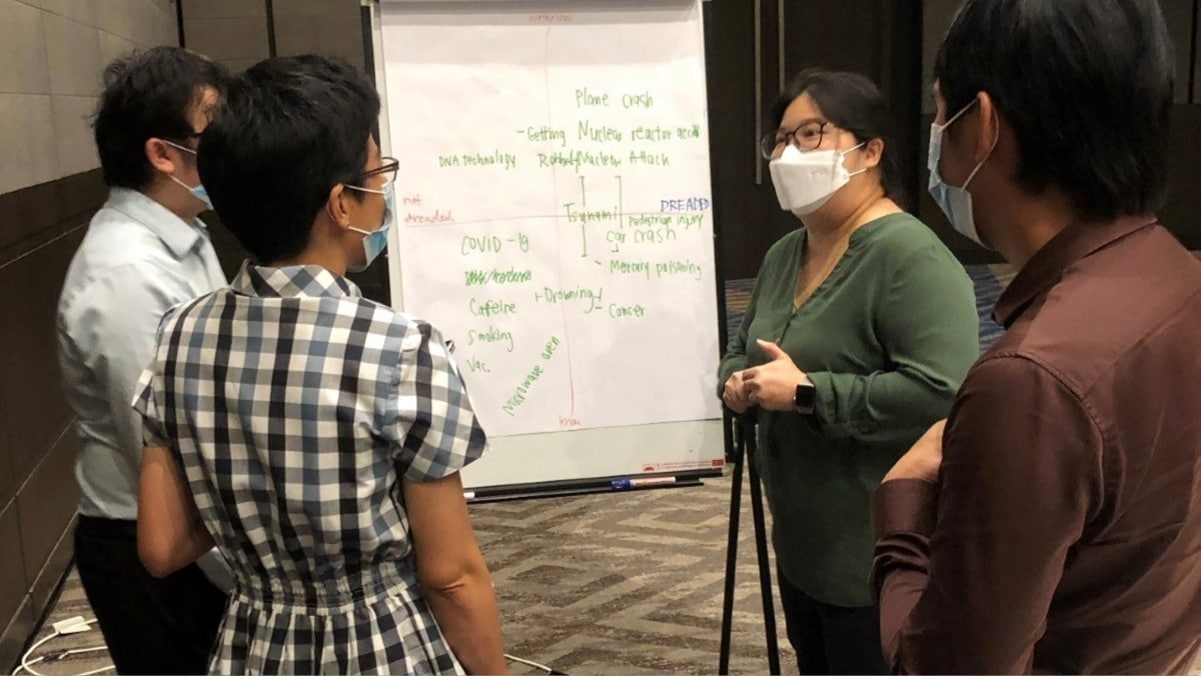At a glance
- CDC trains public health professionals and addresses the challenge of strengthening health systems globally.
- CDC provides formal and informal training to build local capacity in disease surveillance, laboratory systems, emergency response, outbreak investigation, and public health leadership.
- These efforts produce skilled professionals who can effectively prevent, detect, and respond to public health threats, ensuring a robust response to urgent challenges in their countries.
Overview

A well-trained public health workforce is necessary to protect health, recognize disease threats, and make effective decisions when an outbreak occurs. To help attain this goal, CDC works with ministries of health, global partners, and experts across health sectors to build a skilled global network of public health professionals in the regions where CDC works.
CDC currently engages in workforce development programs in more than 55 countries by conducting both formal and informal training opportunities that address all primary workforce functions needed to prevent, detect, and respond to public health threats.
Training programs build local capacity in disease surveillance, laboratory systems, emergency preparedness and response, outbreak investigation, emergency management, and public health leadership. CDC trains people to solve urgent challenges facing their countries to then become leaders in vital public health programs.
Southeast Asia Region

Strengthening capacity to handle public health events through regional risk and crisis communication workshops
CDC's Field Epidemiology Training Program (FETP) trains "disease detectives" in disease surveillance, emergency response, and outbreak investigations. Since the inception of FETP in 1980, FETPs have trained more than 21,000 disease detectives in more than 80 countries. As the COVID-19 pandemic unfolded, public health authorities worldwide struggled with providing information and guidance to the public. To address this challenge, Thailand FETP held a regional workshop on risk communication for Southeast Asia FETP mentors in August 2022. Approximately 30 epidemiologists who supervise FETPs in Cambodia, Indonesia, Japan, Laos, Malaysia, South Korea, Thailand, and Vietnam attended the three-day workshop, held in Chiang Rai, Thailand.
The workshop covered the challenges and opportunities that arise during emergencies and how to communicate with various audiences. Instructional sessions and case studies allowed participants to practice what they learned. Five groups addressed issues raised in different public health case studies: flooding in the Chiang Rai region of Thailand, the effects of cannabis legalization on Thai teenagers, road traffic injuries among food delivery drivers in Bangkok, depression among women in South Korea, and Nipah virus among pig farmers in Malaysia. Participants performed audience analyses, crafted public health messages, conducted simulated media interviews, and created a communication plan.
Dr. Panithee Thammawijaya, Director of Thailand FETP, remarked, "Thailand has a long history of being proactive when it comes to disease surveillance and outbreak response, having created the first FETP outside of North America in 1980. So, it made sense for us to offer this workshop, which will strengthen the risk communication skills of epidemiologists in Southeast Asia and help us be better prepared when the next public health crisis unfolds."
Zambia
Strengthening emergency rapid response capacity
International Health Regulations (IHR) require that member states have the capacity to respond quickly and effectively in emergencies. As public health emergencies often begin and end at the local level, the Zambia National Public Health Institute (ZNPHI) recognized the need to build a formalized public health Rapid Response Team (RRT) program which would empower provinces to address outbreaks quickly. ZNPHI worked with CDC's Zambia Country Office and the CDC Emergency Response Capacity Team (ERCT) to identify and train RRT program managers to establish and maintain staff recruitment, ensure roster maintenance, training, deployment processes, and perform program monitoring.
ZNPHI national RRT managers and CDC co-facilitated an RRT program design and management workshop in two provinces. CDC subsequently supported ZNPHI in leading the workshops in two additional provinces. ZNPHI then delivered the workshop in Zambia's eight remaining provinces. Through this 'cascade' training approach, 59 personnel were selected and trained as RRT managers, and all provinces drafted standard operating procedures (SOPs) as the foundation for implementing the RRT programs locally. By increasing provinces' ability to respond to and recover from emergencies, ZNPHI is strengthening the resiliency of Zambia's outbreak response capacity in the face of any hazard that may arise.
ZNPHI's work positioned Zambia as a regional leader with technical expertise in emergency response management and the development of emergency response SOPs within the Southern Africa region. Zambia's SOPs are currently being used to establish the elements of their RRT program, along with being an example to other countries interested in strengthening their own RRT programs. In Spring 2023, ZNPHI plans to engage key partners to establish an RRT management network to continue improving this national and local RRT model with the expansion to regional response.
Burkina Faso
First country to incorporate GLLP into National Continuing Education Program
The Global Laboratory Leadership Programme (GLLP) showcases how CDC invested substantially in global laboratory workforce development this year. COVID-19 highlighted how strong laboratory systems are critical for global health security to detect outbreaks early and launch a timely response. Within those systems, a highly skilled laboratory workforce including laboratorians trained in leadership skills are needed to ensure sustainability of day-to-day laboratory operations and timely response to outbreaks or emerging disease threats.
Following the creation of the Global Health Security Agenda, CDC collaborated with the Association of Public Health Laboratories, the European Centre for Disease Control and Prevention, the Food and Agriculture Organization of the United Nations, the World Organization for Animal Health (WOAH), and the World Health Organization to develop the GLLP. This program fosters and mentors laboratory leaders and managers to build, strengthen, and sustain public health laboratory systems in their own countries. The curriculum and training for the program incorporate the concept of One Health, recognizing the connection among people, animals, plants and their shared environment.
The program grew from a pilot program in Liberia in 2017 to 20 countries implementing the program in 2022. One key objective of the GLLP is developing a sustainable program owned by the country. Burkina Faso is the first country to incorporate the program into existing continuous education programs. By working with Burkina Faso's ministries of higher education and health in 2022, CDC began the process to integrate the program into the Joseph Ki-Zerbo University Diploma in Ouagadougou. Planning is underway to implement the program in several East African countries in 2023.
These CDC workforce development programs and activities train professionals responsible for improving health and taking the lead in emergencies. They also have fostered strong, mutually beneficial relationships with CDC, ministries of health, and other global partners. Ultimately, an enhanced well-trained workforce and the links created between that workforce and the public health systems they support will better prepare countries to prevent, detect, and respond to outbreaks in the years to come.
